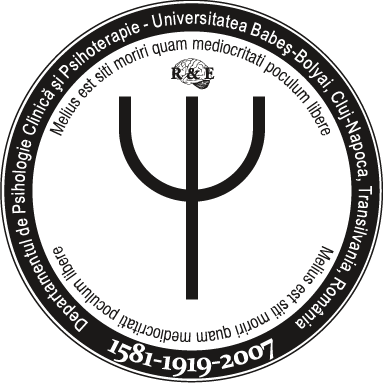Department of Clinical Psychology and Psychotherapy
BABEȘ – BOLYAI UNIVERSITY CLUJ-NAPOCA
Central Values:
Tradition, Excellence, Honor
Practical Values:
(to implement Central Values)
Courage, Common sense, Rationality/Critical thinking
Department Song / chant:
I. Short Introduction
The Department of Clinical Psychology and Psychotherapy is a School of Excellence that is part of the Faculty of Psychology and Educational Sciences, Babeş-Bolyai University of Cluj-Napoca.
At the Bachelor’s level, the Department of Clinical Psychology and Psychotherapy serves the psychology specialization (license) within the Faculty of Psychology and Educational Sciences, Babeş-Bolyai University, together with the Department of Psychology and the Department of Applied Psychology (Hungarian line of study), performing the clinical and associated activities (courses/ seminars/ papers/ services/ practice, etc.) within the specialization. Therefore, the students in psychology (bachelor level) belong to the psychology specialization, specialization served by the Departments mentioned above. Separately, at the Master’s level, the Department of Clinical Psychology and Psychotherapy has developed a Master’s Program in Clinical Psychology, Psychological Counseling and Psychotherapy, at the Doctoral level a Doctoral School in Psychodiagnostics and Scientifically Validated Psychological Interventions, and at the Postdoctoral level a Program of Psychodiagnostics and Scientifically Validated Psychotherapies.
Following the international customs of prestigious universities, the “School/ Department of Clinical Psychology and Psychotherapy” has established its identification elements (e.g., logo, “anthem”, badge, colour), elements that individualize it and coagulate the professional group for teaching, research and performance services and which are used in solemn activities of the Department.
Since the autumn of 2011, under the conditions of the new law on national education, the Department, established in 2007, has been reorganized as a Department. Having an innovative departmental structure right under the old title of Department, practically the structure remained similar.
II. The Clinical field in Psychology
The clinical field in psychology is the most representative in terms of number of professionals and at the social level it is both the prototype of psychology and the dominant motivation of those who want to study psychology. There are three major components of the clinical field:
- clinical psychology;
- psychological counseling;
- psychotherapy.
Clinical psychology is the science that studies the psychological mechanisms involved in health and disease, and their interface with biological / genetic mechanisms. So it has two fundamental components. The first component aims to investigate the psychological mechanisms involved in promoting and optimizing health and preventing pathology.
The second component aims to investigate the psychological mechanisms involved in pathology. Psychological intervention / assistance / counseling in the clinical field refers to those forms of general / primary intervention that are performed by the clinical psychologist who has no distinct training in psychological counseling and / or psychotherapy.
Psychotherapy refers to the psychological intervention that modifies the psychological mechanisms involved in health and disease; it can be practiced by psychologists and doctors (psychiatrists) after a rigorous training program in a specific form of psychotherapy.
Psychological counseling is a form of psychological intervention that can be practiced only by psychologists, after a rigorous training program in a specific form of psychological counseling, which addresses more to the first component of clinical psychology (health promotion, primary prevention, secondary and tertiary, subclinical pathology, etc.).
The clinical psychologist (understanding here also the psychological counselor and the psychotherapist for the specific form of psychotherapy he practices) fulfills several functions:
- (psycho) psychological diagnosis and clinical evaluation; aims to identify the psychological factors involved in health and disease;
- general / primary and specific psychological intervention, the specific one, acquired after advanced professional training programs, being expressed in psychological counseling and psychotherapy; aims to control, at various levels of expertise (general / primary versus specific), the psychological factors involved in health and disease; A recent frontier development is represented by genetic counseling, represented in our School of psychologists and doctors with advanced training in the field.
- research; aims to investigate the role of psychological factors in health and disease, often at the interface with biological and genetic mechanisms;
- Education and Training; aims to involve those already trained in this field both in training new generations of professionals to become clinical psychologists, psychological counselors and psychotherapists (initial training) and in their professional development (continuing education).
The clinical psychologist, the psychological counselor and / or the psychotherapist can work in medical units (eg hospitals, polyclinics, medical offices), own private offices, centers, foundations and associates, but also in any environment (educational / school, organizational / corporate / industrial , judicial / legal, security and national defense, etc.) in which their expertise in health and disease is involved.
For details on this information see:
- Romanian College of Psychologists
- David, D., Lynn, S., & Ellis, A. (2009). Rational and irrational beliefs: Implication for research, theory, and clinical practice. Oxford University Press, London / New-York, UK / USA.
- David, D. (2006). Clinical psychology and psychotherapy. Polirom Publishing House: Iaşi
- American Psychological Association: Division of Clinical Psychology (12), Division of Psychotherapy (29), and Division of Psychological Counseling (17)
